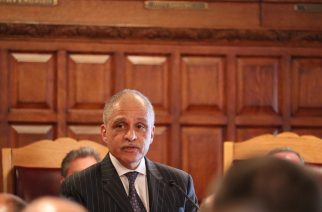
Gov. Kathy Hochul has granted clemency to seven individuals, including five pardons and two commutations, noting the individuals have demonstrated remorse, exemplified rehabilitation and displayed “a commitment to improving themselves and their communities.”
One commutation includes a reduced sentence for an individual originally convicted under the Rockefeller Drug Laws who had been serving one of the longest sentences for a non-violent drug-related conviction in the state.
Hochul has said she will grant clemency on an ongoing basis, rather than only once at the end of the year, as the former governor had done.
“As governor of New York, it is my responsibility to exercise the power of clemency to show that change and redemption are possible,” Hochul said.
Georgia Weir-Demercado, 49, has lived a crime free life for 27 years and has earned an associate’s degree, bachelor’s degree, and a real estate license. She came to the United States at the age of six and has lived in the United States for more than 40 years. She is married to a United States citizen and has three United States citizen children. Weir-Demercado was convicted of attempted criminal sale of a controlled substance in the third degree in 1995. A pardon will help her pursue naturalization to become a U.S. citizen.
Asdrubal Gonzalez, 64, has lived a crime free life for 30 years. He entered the United States as a lawful permanent resident in 1971 at the age of 13, more than 50 years ago. He has a wife and two daughters who are all U.S. citizens, has been gainfully employed at an engineering firm for close to three decades, and is an active member of his local church community. Gonzalez was convicted of attempted criminal sale of a controlled substance in the third degree in 1993 and attempted criminal possession of a controlled substance in the third degree in 1991. A pardon will help him pursue naturalization to become a United States citizen.
Ashan Grant, 46, has lived a crime free life for 19 years. Grant, a Canadian citizen and resident, serves as a mentor in his community and operates a small business. He was convicted of criminal possession of marijuana in the fourth degree in 2003. A pardon will help Grant visit his son and other family members living in the United States.
Pawel Sztremer, 46, has lived a crime free life for 23 years. Sztremer moved to the United States at 14 years old and has lived here for more than 30 years. He currently owns and operates a landscaping and snow removal business. Sztremer was convicted of harassment in 1996, petit larceny in 1998, criminal mischief in the fourth degree in 1998, and attempted burglary in the second degree in 1999. A pardon will help remove the threat of deportation and help him pursue naturalization to become a United States citizen.
Gerson Ramirez, 36, has lived a crime free life for 13 years. Since his most recent conviction, he has earned a college degree and maintained employment at a restaurant for more than 10 years, now serving as the manager. Ramirez was brought to the United States when he was approximately 18 months old and has lived in the U.S. for nearly his entire life. Ramirez was convicted of aggravated unlicensed operation of a motor vehicle and aggravated driving while intoxicated in 2009, and driving without a seatbelt, following too close, driving while ability impaired by alcohol, and driving without license in 2004. A pardon will help Ramirez avert the threat of deportation and remain in the United States with his wife, infant child, and other U.S. citizen family members.
One of those receiving a reduced sentence, Bryon Russ, 47, was convicted of four counts of robbery in the first degree, two counts of burglary in the first degree, burglary in the second degree, robbery in the third degree, assault in the first degree, criminal possession of a weapon in the second degree, and conspiracy in the fourth degree in 2001. While serving his sentence over the past 23 years, Russ has been enrolled and continues to take classes towards a bachelor’s degree and has completed a range of counseling and volunteer work including starting an initiative that raises donations for backpacks and school supplies for children.
The other person who received a commutation, Joaquin Winfield, 58, was convicted of criminal possession of a controlled substance in the first degree, two counts of criminal possession of a controlled substance in the third degree, criminal sale of a controlled substance in the third degree, criminal use of drug paraphernalia in the second degree and criminal possession of a weapon in the fourth degree in 1997.
Winfield was sentenced to 37-and-a-half years to life in prison under the Rockefeller Drug Laws in place at the time of sentencing and has served more than 26 years. His sentence is now among the longest of any in the State stemming from a conviction for drug-related non-violent offenses.
Governor Hochul granted clemency to 13 individuals in December of 2022, with nine pardons and four commutations of prison sentences, including two prisoners serving murder sentences, a domestic violence survivor sentenced for manslaughter in the death of her abuser and pardoned several immigrants who were facing deportation.
The Governor’s Office has taken a number of new steps in the clemency process to improve transparency and communication.
For example, the Executive Clemency Bureau has implemented a new policy of sending regular letters to people with clemency applications, informing them of their case status and providing information about how to submit supplemental information in support of their applications.
The Governor’s Office has also launched an updated website to assist clemency applications for both pardons and commutations to provide prospective applicants with guidance about what information to include when they apply.
Typically, clemency will only be considered in circumstances where there is no other administrative process that can provide the type of relief a clemency applicant is seeking.
To be considered for clemency, the prisoner needs to submit an application to the Executive Clemency Bureau. An attorney, or another representative such as a family member, can also submit an application to the Executive Clemency Bureau on a prisoner’s behalf.









